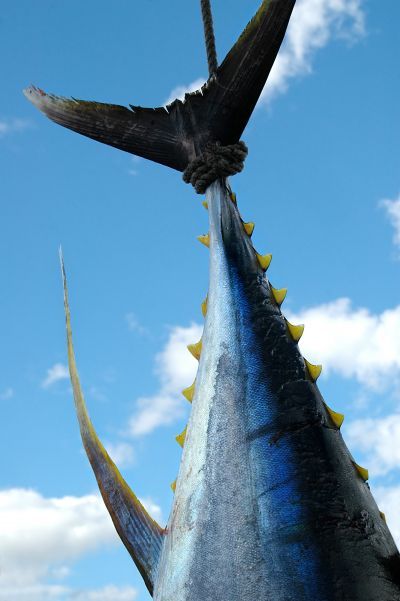Atlantic bluefin tuna: the sushi king

Atlantic bluefin tuna, the international trade in which Europe wants banned during a key UN meeting on endangered species that opens on Saturday, may be prized by sushi and sashimi lovers but given its sky-high price is practically only ever now found on high-end restaurant menus.
THE KING OF TUNA
Thunnus thynnus, to give it its proper name, can grow to four metres long (more than 13 feet) and lives in temperate waters from the equator to northern Norway, and from the Gulf of Mexico to the Black Sea. It can cross the Atlantic in 60 days, has a life expectancy of between 20 and 40 years and breeds either in the Gulf of Mexico or the Mediterranean. The western stock is smaller and harder to fish, so the Mediterranean offers the most fertile fishing grounds, representing 80 percent of all catches.
COSTLY AND INCREASINGLY RARE
A single Atlantic bluefin tuna can fetch up to 120,000 euros (more than 160,000 dollars) at auction. Its price means it is rarely available on supermarket shelves. "In fishmongers or the sort of basic sushi bars you see in every big city, you more often find the tropical tuna from the Indian Ocean, or patudo, which also has red flesh," underlines researcher Alain Fonteneau.
OVEREXPLOITED, ALMOST EXCLUSIVELY EXPORTED TO JAPAN
Scientists broadly agree that overfishing has gone on far too long: from 1957 to 2007, global bluefin stocks collapsed by 75 percent - 60 percent just in the last 10 years.
France, Spain and Italy, in that order, land the biggest catches - with half of the global take between them. However, from 60,000 tonnes per year in recent memory, the harvest had halved by 2008, even counting illegal fishing, according to Fonteneau.
GLOBAL PROTECTION
For 2010, the International Commission for the Conservation of Atlantic Tunas, which groups fishing states, has already decided to lower the permissible global catch to 13,500 tonnes.
"For long and weary, ICCAT's credibility was undermined by quotas that were not respected and that ignored scientific advice," Fonteneau said.
"Now, though, controls are being much more strictly applied and if the new quota were to be respected for a period of several years, there would be no more scientific justification for banning international trade in the fish."
Join our commenting forum
Join thought-provoking conversations, follow other Independent readers and see their replies
Comments
Bookmark popover
Removed from bookmarks